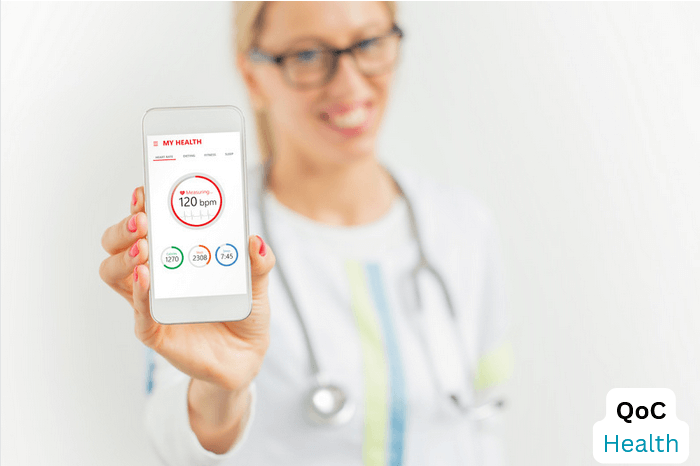As mobile health applications continue gaining popularity, many users are rightfully wondering about their safety. These apps promise convenient access to your personal health information anywhere.
But are mobile health apps safe to use? Yes. However, while mobile health apps can offer convenient access to personal health, they also present unique privacy and security risks.
Many apps do not implement robust security features or encrypt data transmitted to third parties. However, some laws aim to regulate how medical information is handled to protect consumers better.
We need to understand this area better since mobile apps will soon become a part of the healthcare system. Let’s look at a few concerns people and experts might have around them.
Are Mobile Health Apps Safe to Use?
Whether tracking activity levels, monitoring chronic conditions, or facilitating communication with doctors, mobile health apps promise to empower patients and support good health.
However, with this new wave of digital health also comes risks regarding how users’ sensitive medical data is collected, stored, and protected. That raises the question, are mobile health apps safe to use?
While the convenience of accessing health information from your phone is undeniable, mobile apps require access to and store highly private details.
These include things like symptoms, medications, biometric readings, and more. Unfortunately, the security of these applications and the networks they rely on can sometimes fall short of best practices.
Researchers analyzing top apps have found issues such as poor encryption of data transmission, failure to verify app developers’ identities, and lack of transparency around how personal data is used. These vulnerabilities could allow bad actors to access users’ records undetected or enable data to be lost or stolen.
On the other hand, some evidence suggests that when properly designed and regulated, mobile health tools enhance privacy and safety compared to traditional paper records.
Digital storage and transmission systems offer more robust login security and audit trails when data is accessed.
Unique phone identifiers also enable risk assessments to ensure personal records aren’t exposed to fake clinicians or stolen devices.
If built to rigorously protect health information according to industry standards and federal regulations, mobile platforms also open opportunities to improve user consent practices and data oversight.
Of course, there will always be risks whenever sensitive data is involved, and digital access points add new surfaces for threats.
However, with adequate safeguards, education of consumers and developers, enforcement of protection laws, and continued technological advancement, the risks of mobile health apps need not outweigh the benefits they offer.
With care and diligence, these tools could greatly empower patients while preserving confidentiality.
Related: How Do Mobile Application Change Healthcare Industry?
Privacy And Security Risks Associated With Mobile Health Apps?

The privacy [1]and security of personal health information shared through mobile apps is a crucial concern. When apps collect, store, and transmit data in an insecure manner, users are vulnerable in essential ways.
Here are some of the leading privacy and security risks associated with mobile health apps:
Poor Data Encryption
Many apps still need to encrypt health records during transmission between devices and servers sufficiently and while stored on phones or in the cloud.
Outdated or no encryption allows sensitive information to be readable in plaintext if the data is intercepted during network transfer or accessed by unauthorized parties who obtain stored files.
Experts have found that apps transfer records over HTTP without TLS encryption, exposing information to snooping.
Insecure Access Controls
Apps too often rely on weak authentication methods like simple passcodes or lack basic account security features to restrict access.
Not utilizing best practices enables easy access to users’ complete medical histories if login credentials are phished or inadvertently leaked.
Excessive Data Collection
Some applications engage in “data mining,” silently collecting far more personal user details than necessary actually to deliver health features and services. Everything from precise location tracking and contacts to app usage data may be vacuumed up to build detailed profiles or sold for ads.
This violates users’ consent and expectations around what personal information the app actually requires to function as intended for medication, symptom, or activity tracking.
Third-Party Sharing
Health data handled by some mobile apps is disclosed or sold to third parties like data brokers, advertisers, analytics firms, or other companies without giving users transparent options to opt-out or consent to such sharing.
Once exported from the device ecosystem, there are fewer safeguards on how records may spread more broadly, weakening privacy assumptions when sensitive records are exposed more widely than anticipated within the app.
Insufficient Identity Verification
Without protocols to verify the credentials of those viewing or entering information, some apps leave open the risk of impersonation, tampering, or unknown individuals accessing personal records.
A patient may need to be sure only legitimate doctors and care providers are accessing results or that entries are not being altered without their knowledge.
Data Breach Vulnerabilities
Even if encryption and other data protections are utilized at rest and in transit, underlying app infrastructure or the servers and databases where health information ultimately resides could remain vulnerable to network intrusion or hacking.
That is, if not regularly updated, patched, and monitored against emerging malware and exploits. This could enable sensitive stored records to be part of larger breaches and unauthorized exposures.
Related: The Positive Effects Of Mobile Application In Healthcare
The Challenges In Developing Secure Mobile Health Applications?
Balancing security, functionality, and ease of use when designing mobile health apps is challenging. Developers must address threats while still providing convenient access to resource-limited devices.
Here are some of the key challenges:
Limited Device Capabilities
Phones and tablets have constraints like lower processing power, storage limits of just a few gigabytes, and the need to maximally optimize battery life, all while supporting computationally intensive practices like encryption.
Authentication using biometrics can drain power reserves quickly. These restrictions complicate using safer methods like direct device encryption of stored health records.
User Experience Trade-Offs
More robust security [2] often involves multi-factor authentication that frustrates users accustomed to one-touch logins or prevents background syncing of essential health reminders.
If check-ins become too cumbersome, people may abandon apps counterproductive to wellness goals. Developers struggle to find the right security balance without disrupting the central experience driving adoption and positive behavior change.
Updating Legacy Code
For apps reliant on outdated platforms with years of legacy features, rooting out vulnerabilities while avoiding technical debt involves careful regression testing and QA efforts to avoid introducing new bugs.
The cost and workload of upgrading underlying architecture can be prohibitive for resource-constrained development teams.
Interoperability Expectations
Given diverse standards across healthcare providers for systems like electronic health records, developers face hurdles ensuring easy and secure integration of user data.
Compatibility is paramount but complex when factoring multiple encryption solutions, system capabilities, and permissions schemes among organizations.
Responding to New Threats
Cyberattack methods evolve rapidly, including tactics like phishing users out of credentials. Maintaining diligent threat-modeling and security response procedures stretches limited budgets and brainpower.
These are the same resources already devoted to new feature development and bug fixes on tight deadlines.
Cost and Resource Limitations
Implementing features like mandatory encryption of stored health records and regular security audits requires hiring dedicated developers, QA analysts, and operational staff. T
Reliance on Third Parties
Even where developers fence off third-party integrations, vulnerabilities in commonly used social plugins, analytics services, or key management systems still potentially expose user data.
This is when not responsibly maintained and updated by their owning organizations, a challenge partly outside developers’ control.
Educating Users
Promoting security best practices among non-technical users is an ongoing task, as habits like password reuse, downloading unverified apps, or lack of updates potentially weaken implemented safeguards.
Influencing behavior change across diverse demographic groups strains limited marketing and communication budgets.
Conclusion
Are mobile health apps safe to use? While mobility health apps can provide convenient access to personal health information, they also present privacy and security risks if data is not adequately protected. Developers face many challenges in balancing security, functionality, and usability.
With careful design following best practices and regulations, ongoing maintenance, user education, and responsibility from all parties involved, these apps can be used safely while delivering user benefits. Continuous improvement is needed as threats evolve.
- How To increasebrown fat: What To Take? - July 23, 2024
- Does Brown Fat Make You Lose Weight? Benefits And Impact - July 21, 2024
- Does Coffee Increase Brown Fat? - July 15, 2024
